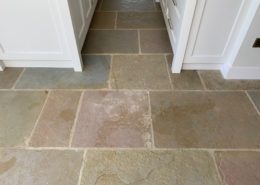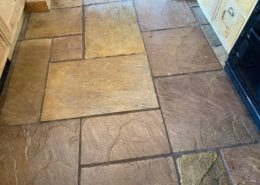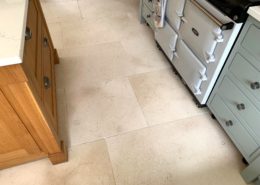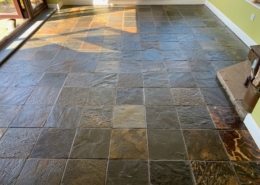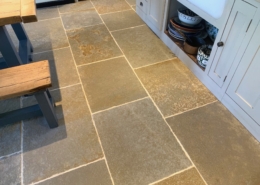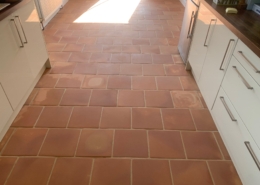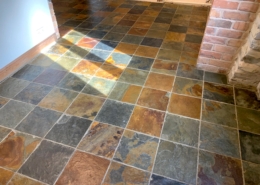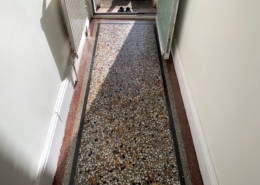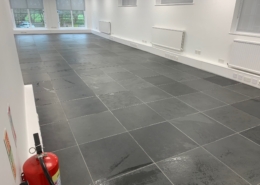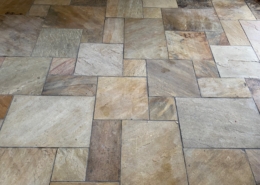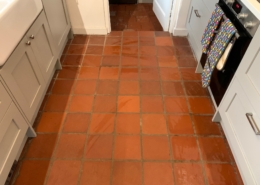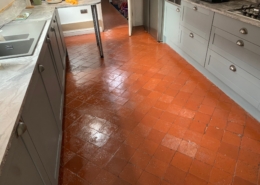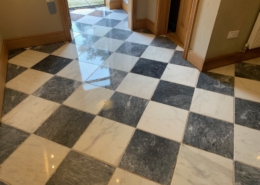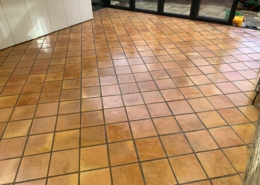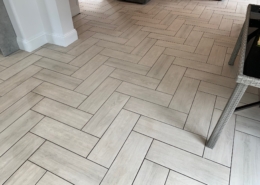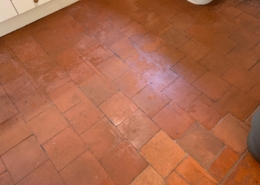Flagstone cleaning Warwickshire
Flagstone has been a popular flooring choice for many years, particularly in historic buildings and farmhouses. It offers not only the beautiful appearance of natural stone, but also the durability and strength which you may associate with man-made materials. Often used for flooring both indoors and outdoors, it can also be used for walls. All in all flagstone is highly versatile, but if yours could do with sprucing up, get in touch and ask about our flagstone cleaning and restoration service in Warwickshire.
Common issues with flagstone flooring
Even the most durable floor types can quickly show signs of wear and become damaged if they’re not correctly looked after. Most commonly, large flagstones can become uneven over time. This can be evident is a slight wobbling of the stones, or at worst can result in cracks in the surface. The dense rock requires a sturdy subfloor to support it, any movement beneath will quickly become evident on top.
Flagstone floors can also be vulnerable to the damaging effects of moisture. Where flagstones haven’t been correctly maintained, liquid marks can become apparent on the surface. Worse still, if left untreated, the stone can eventually soften, potentially causing flaking and chipping of the stone.
It is also common for flagstone floors to gradually lose their original life and sheen. This can happen so gradually that it’s not always immediately obvious that the stone needs servicing. Regular footfall, dust and dirt will discolour and dull the surface of the flagstones and, when the dirt has sufficiently bedded in, our flagstone cleaning and restoration service in Warwickshire is really the only way to get it looking great again.
In cases where flagstones have been secured by grouting we often encounter worn grouting. This is normal, the grout is softer than the stones and will be the first thing to feel the effects of spillages, drops and general dirt ingress.
How we maintain
To restore or enhance the appearance of a flagstone floor there are a range of options available. A heavy buff or polish can vastly lessen the impact of ground in dirt and discolouration, if not remove it entirely. Agitation chemicals are carefully chosen in order to loosen surface dirt, which can then be removed far more easily.
By professionally applying a high quality sealer we aim to play to the strengths of the stone and provide results that last longer. It’s very important to properly seal flagstone since without a good seal it will absorb spillages and moisture quite readily. With a good sealant, flagstone flooring has a stunning appearance but any sealant will eventually wear down under regular use. Restoring the sealant with our flagstone cleaning and restoration service in Warwickshire once a year or so will ensure the longest lasting protection for your flagstone. A professional knowledge of the correct cleaning and sealant chemicals for flagstone is essential to avoid damage from the wrong chemicals.
In cases where the flagstone has cracked we would taken an assessment of the damage before deciding on the most appropriate solution. Where the damage is beyond repair we are often able to help with sourcing replacement stones.
Will repairing my flagstone floor cause disruption?
In most cases our flagstone cleaning and restoration service in Warwickshire can be completed in a day. We aim to perform our work in the most considerate way possible so as to cause the least disruption to your home. Repairs don’t generally involve large or noisy pieces of machinery, our polishing equipment is portable and the strongest chemicals used would be completely neutralised before the job is completed. You can rest assured our services will be completed as safely and efficiently as possible so you can get back to enjoying your beautiful flagstone floor, trouble free.
If your flagstone floor tiles need some care and attention then don’t hesitate to get in touch with Tile & Stone Medic Warwickshire today and ask about our flagstone cleaning and restoration service in Warwickshire!
FAQs
The process we carry out will depend on your specific floor and the use that it gets. There will be variations for different materials and the finish that you wish to achieve. The process will also be impacted by the full scale of work that we carry out, for example which types of cleaning and restoration are being performed. It is not unusual to apply several layers of sealant if this is necessary and appropriate.
Firstly, a floor should always be sealed when it is first laid. Get in touch with us straight away if this hasn’t been carried out already. It will also need periodic sealing in order to protect the floor on an ongoing basis. How often sealing is required depends on a number of factors such as the specific material used for your flooring and the kind of use it has to survive. For example, a bathroom with natural tiles that is frequently exposed to water may require sealing more often than porcelain tiles in a kitchen. Frequent maintenance, such as sweeping and hoovering up the dust and grit that erodes floors when trodden on can help. Once the sealant is worn away, not only will scratches be more likely, the risk of staining or permanent damage from liquids is drastically increased as there is no protective layer to prevent absorption. If in doubt get in touch with our team of friendly technicians who can discuss your needs.
We have a range of high quality Faber products which will help protect your floors from damage. As every type of floor is different and has myriad uses, we will consult with you to work out the best way to protect your investment. We can apply topical sealants which form a protective layer on top of the floor, or if needed an impregnating sealant, which will be partially absorbed into the stone or tiles. There are many variations of these sealants and as each floor type has unique characteristics and vulnerabilities we can work with you to find and apply the the best kind of protection.
Absolutely. If this was not carried out by those who fitted the floor get in touch immediately to ensure that the appropriate protection can be applied as promptly as possible. We would recommend that this is carried out once the flooring is in place as this means the grout, which is generally more porous, will also be protected.
We apply a sealer to a floor in order to protect it. Different types of floor, both manmade and natural stone, are vulnerable to different sorts of damage. They can all be harmed by chemicals to a certain degree, even by the acid in food and drink spillages, as they will be very slightly porous. As well as this, they can be worn away by physical damage. Even foot traffic can have a big impact if dust or grit has built up on the floor, since it increases abrasions. A sealant will reduce the chance of a spill becoming a stain by reducing the floor’s ability to absorb liquids. It can also help protect the appearance of the floor by forming a protective barrier. A sealant won’t prevent all damage and it will still wear away over time, but it will help your floors last longer, helping protect your investment. Sealants will even help protect your floor from UV radiation which can lead to fading over the lifespan of a high value stone or tiled floor. We can consult with you to find the best sealant for your floor and the type of use it gets to make sure it receives the best form of protection.
We are happy offer advice on best practice to look after your flooring, but it depends on the type of floor you have. Once we’ve had a look at it we’ll be able to help.
Yes, we have a range of fillers we can use to repair chipped or dented stone. Please note we can only carry out floor repairs as part of a full deep clean or restoration for your stone floor. Unfortunately, we are not able to attend to carry out repairs in isolation.
Usually we are able to stabilise stone flooring where it has become loose. We can repair grouting and make spot repairs to the subfloor where necessary. However please note, we do not offer a re-grouting service and we can only carry out floor repairs as part of a full deep clean or restoration for your stone floor. Unfortunately, we are not able to attend to carry out repairs in isolation.
Almost certainly. Send us a picture or a description and we’ll identify your stone. We always assess a surface before work starts in order to pick the most appropriate solution.
Whilst we may use specialist chemicals in the course of our work, we can assure you that by the time we leave all residues will be gone and your tile or stone flooring will be perfectly safe for everyone to use. We work to extremely high standards of health and safety, conducting proper risk assessments where appropriate and never putting you or anyone else in danger.
We always work in the most considerate way possible. Work will be tailored to your needs and will fit around your schedule where possible. We avoid bringing loud or bulky machinery into your home and when a job is complete we thoroughly clean up after ourselves to leave your space looking as tidy as it did when we arrived.



